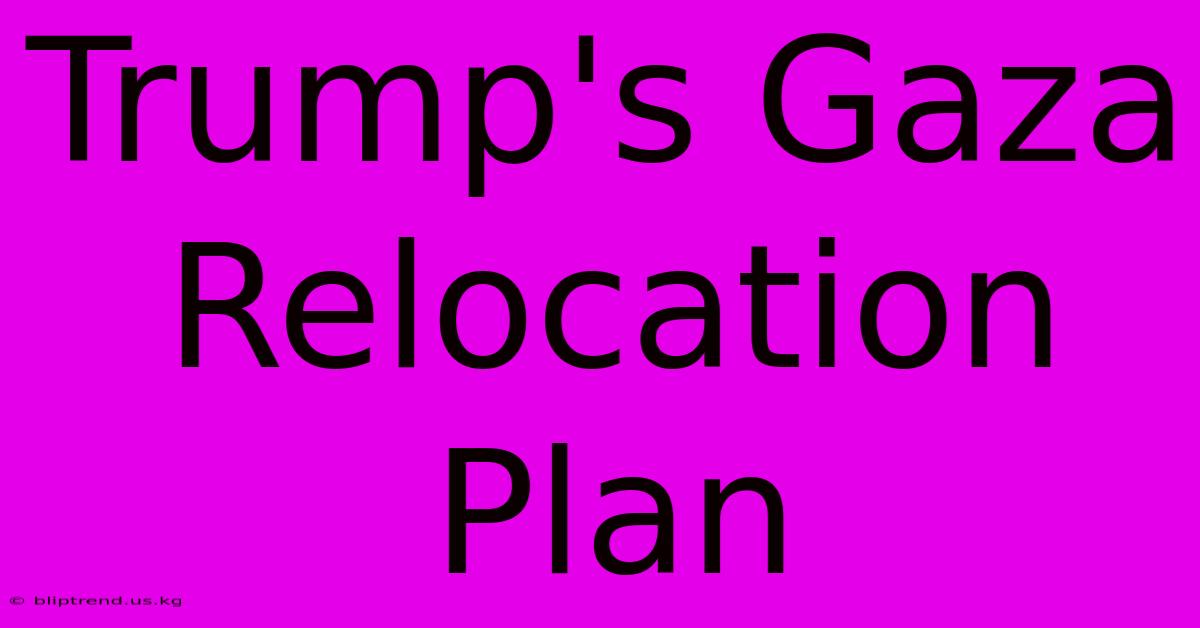Trump's Gaza Relocation Plan

Discover more in-depth information on our site. Click the link below to dive deeper: Visit the Best Website meltwatermedia.ca. Make sure you don’t miss it!
Table of Contents
There is no known public plan proposed by Donald Trump regarding the relocation of the population of Gaza. While Trump's administration took various stances on the Israeli-Palestinian conflict, including supporting Israeli settlements and recognizing Jerusalem as Israel's capital, there's no record of a specific proposal to relocate Gazans. Therefore, a detailed article about a non-existent plan is impossible.
However, we can explore hypothetical scenarios and discuss the potential implications of if such a plan were ever proposed, analyzing the complexities it would involve and the likely reactions it would generate.
Hypothetical Analysis: A Gaza Relocation Plan – Challenges and Implications
Any plan involving the mass relocation of the population of Gaza would be incredibly complex and fraught with ethical, logistical, and political challenges. Let's analyze some potential aspects:
1. The Ethical and Humanitarian Dimensions:
- Forced Displacement: Relocation, if not voluntary and consensual, would constitute a violation of international human rights law, specifically the right to freedom of movement and residence. The forced displacement of a large population raises serious ethical concerns, potentially leading to accusations of ethnic cleansing or crimes against humanity.
- Right of Return: The Palestinian right of return, the right for Palestinian refugees and their descendants to return to their ancestral homes in what is now Israel, is a central issue in the Israeli-Palestinian conflict. A relocation plan might be viewed as attempting to circumvent this right, further inflaming tensions.
- Ensuring Safe and Dignified Relocation: If relocation were voluntary, it would still require significant international cooperation to ensure the safety and well-being of those relocated. This includes providing adequate housing, infrastructure, employment opportunities, and access to healthcare and education in the new location. The scale of such an undertaking would be immense.
- Compensation and Resettlement: Fair compensation for lost property and livelihoods would be essential. Without adequate financial support and resources, the relocation could lead to widespread poverty and social unrest among the relocated population.
2. Logistical Challenges:
- Scale of the Operation: Gazza has a population of over 2 million people. Relocating such a large number of individuals would be an unprecedented logistical undertaking, requiring extensive planning, resources, and international coordination.
- Infrastructure and Resources: The receiving country or region would need to possess sufficient infrastructure and resources to accommodate the influx of new residents. This includes housing, sanitation, utilities, schools, hospitals, and employment opportunities.
- International Cooperation: A plan of this magnitude would necessitate significant international cooperation, requiring the support of numerous countries and international organizations. Reaching consensus among diverse stakeholders would be a major hurdle.
- Security Concerns: The security implications of relocation are significant. The process would need to be carefully managed to prevent violence or conflict.
3. Political Ramifications:
- Palestinian Resistance: Such a plan would almost certainly face strong opposition from Palestinian factions, potentially leading to increased violence and instability in the region.
- International Condemnation: The international community would likely condemn a plan perceived as unjust or coercive. Such condemnation could lead to sanctions and further complicate the situation.
- Impact on Israeli-Palestinian Peace Negotiations: The prospect of relocation would almost certainly complicate any attempts to revive peace negotiations between Israel and the Palestinians.
- Regional Instability: The plan could destabilize the entire region, potentially leading to wider conflicts.
4. Potential Destinations:
Speculating on potential destinations for relocated Gazans would involve a range of considerations including:
- Arab Countries: Several Arab nations might be considered, but the ability to absorb such a large population and the potential political fallout would need to be assessed.
- International Support: Securing funding and aid from international organizations would be paramount.
Conclusion:
While there is no actual Trump Gaza relocation plan, exploring the hypothetical ramifications highlights the immense complexities and ethical dilemmas inherent in any such proposal. The sheer scale, potential human rights violations, and political consequences would make it a highly controversial and almost certainly unsustainable endeavor. Any attempt at addressing the complex situation in Gaza requires a multi-faceted approach focused on diplomacy, humanitarian aid, and long-term solutions that prioritize human rights, peace, and security for all involved. Any proposal, regardless of who originates it, must undergo thorough and transparent scrutiny involving all stakeholders to avoid exacerbating an already volatile situation.

Thank you for taking the time to explore our website Trump's Gaza Relocation Plan. We hope you find the information useful. Feel free to contact us for any questions, and don’t forget to bookmark us for future visits!
We truly appreciate your visit to explore more about Trump's Gaza Relocation Plan. Let us know if you need further assistance. Be sure to bookmark this site and visit us again soon!
Featured Posts
-
Cub Scouts Leader Crossword Clue
Feb 05, 2025
-
Baseball Great Who Had A Career Batting 1 Down Of 304 Crossword Clue
Feb 05, 2025
-
Form A Splinter Group Crossword Clue
Feb 05, 2025
-
An Integral Can Compute It Crossword Clue
Feb 05, 2025
-
Eagles Perch Crossword Clue
Feb 05, 2025
